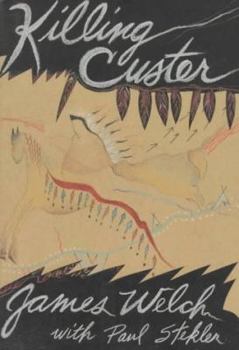Killing Custer: The Battle of the Little Bighorn and the Fate of the Plains Indians
Select Format
Select Condition 
Book Overview
General Custer's ill-fated attack on a huge encampment of Plains Indians in 1876 has gone down as the most disastrous defeat in American military history. Much less understood is how disastrous the encounter was for the "victors". Within 15 years, no American Indians resided outside of reservations. Here is Welch's poignant resurrection of the Indian side of the story. 75 illustrations.
Format:Hardcover
Language:English
ISBN:039303657X
ISBN13:9780393036572
Release Date:January 1994
Publisher:W. W. Norton & Company
Length:320 Pages
Weight:1.45 lbs.
Dimensions:1.2" x 6.5" x 9.5"
Customer Reviews
5 ratings
INDIAN VIEW OF LITTLE BIGHORN
Published by Thriftbooks.com User , 20 years ago
The value of this book lies in the ability to present the Indians as humans rather than the evil savages ingrained into most American s during the 19th and 20th centuries. Mr. Welch succeeds in showing the indecision and doubt that plagued Sitting Bull and Crazy Horse during the latter years of the Plains War. The passages explaining the negative aftermath of the Little Bighorn for the Plains Indian because it is overlooked or ignored by history books. I thought Mr. Welch's decison to weave the Little Bighorn into the story of making the film about the battle made the book more interesting. It allowed the inclusion of unrelated items, such as the gravesite of Bill Thomas, which provided additional background to some of the major points of the book. It is an interesting and easy read that would be enjoyable to anyone slightly interested in Custer, Little Bighorn or the Plains Indians.
it's a good day to die
Published by Thriftbooks.com User , 23 years ago
It's a good day to die; the book was issued in France under this title.Looking for other books on this american site,I was surprised and shocked to read some of the reviews.I think this book is important . Of course, I guess that many books have been written about this subject, and I don't know if this one gives us more informations than the others.But what is important to me is the fact that this book has been written by an indian,a man who has more than anyone else, the right to speak about what happened to his people. The 20's century great democracies, including France,can't be proud of their foundations.America with indian and black peoples,France in the West Indies ,and North Africa.One thing surprises me in the reviews of this book:a reviewer only writes about the Little Big Horn battle,although the book goes from 1869 to Sitting Bull's death in 1890.He is sad not to have been able to see the Reno site while visiting the country; personnaly,I would have prefered (and hope I'll have the opportunity) to spend a few hours on the place,near the river,where the Sioux and Cheyennes were living with their families.Another reviewer complains about "the political subtones of the author".And so what? Senator McCarthy fortunately died,no? And I think Mr Welch ,like any other human being, can and has to have a political conciousness.YOu can agree with him or not,but you can't reproach him with telling what he thinks .I was glad to read this book,and I recommend it to you.
I liked the the perspective the author gives on Custer.
Published by Thriftbooks.com User , 25 years ago
A very fresh point of view on an almost mythical historical figure. The author shows that Custer had been blessed with more luck than ability, and his luck ran out. The author also did a great job of telling how the death of Custer was also the death of the Souix nation.
Excellent
Published by Thriftbooks.com User , 26 years ago
A well researched book about Custer, Sitting Bull and the famous battle written from a slightly different perspective. A joy to read!
For those of you who never liked Custer anyway.....
Published by Thriftbooks.com User , 27 years ago
James Welch's KILLING CUSTER is one of the most interesting historical works I've read in a long time. Told from the Indian point of view, the book discusses the major battles and skirmishes leading up to the climactic piece, the "Battle of Little Bighorn." Along the way, Custer treats us to a glimpse of the lifestyles and mindsets of several Northern Plains tribes. The book offers historical information as well as personal thoughts, as the author tours the land where many of these battles occurred. We tag along on his journey, and meet many fascinating people, from descendants of battle participants, to current leaders among Native peoples. Although at times Welch's emotions spill over into his words, leaving the reader concerned that she may be reading a slanted version of events, his account is for the most part level-headed. The book is a wonderful account of the Battle of Little Bighorn, and a testimony to a modern Indian's thoughts on this monument to a white loser (Custer) rather than to Indian victors. It will not please Custer buffs, nor will it even begin to satisfy battle-strategy fanatics. But for those readers who like to see other sides of a story, this book will entrance you and even make you weep; for while the large gathering of Northern Plains tribes did manage to succeed in defeating the most famous Indian fighter of the age, they nonetheless lost the war -- and many modern Indians feel they are still suffering the consequences. If you love Plains history, battle histories, Indians or underdogs, you will love this book. If you are a raving Custer buff, you will have great fun tossing this book into the wall -- but you will go pick it up and continue reading it, and tossing it again and again. You just can't put this book down






